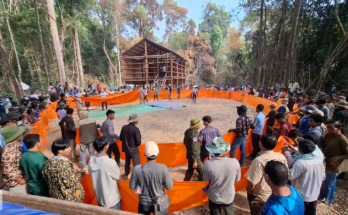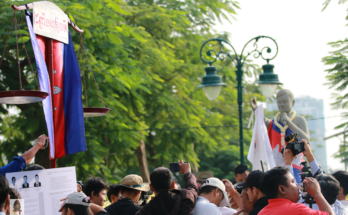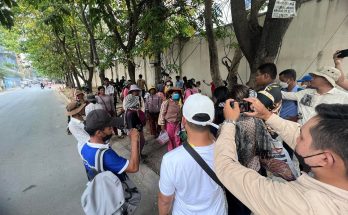Appeal Court Should Drop Charges Against Mam Sonando
Phnom Penh, 13 March 2013 – The Cambodian Human Rights and Development Association (ADHOC) strongly urges the Court of Appeal to drop all charges against Mam Sonando on 14 March 2013. The case against him is paper-thin, a point acknowledged by the prosecutor when he requested that the two most serious charges against Mam Sonando be dropped at the Appeal hearing on 06 March 2013. The prosecutor then introduced a new charge related to land grabbing – a supreme irony given Mam Sonando’s work to educate people about their land rights – that does not fit the facts from the original incident.
The Court of Appeal should also drop all charges against Kann Sovann and Touch Ream, two villagers accused of plotting with Mam Sonando. These men are innocent victims of the authorities’ attempts to silence Mam Sonando, and have likewise been convicted on spurious charges.
Mam Sonando –the owner of independent Beehive Radio and president of the Democrats Association – was sentenced to twenty years in prison on 01 October 2012 in relation to a so-called secessionist movement in Broma village, Kratie province. The charges against him have been widely perceived as politically motivated. His detention has brought international outrage and led to much criticism of the Cambodian judicial system. Mam Sonando stressed during his appeal that the Democrats Association works for the benefit of the Cambodian people by educating them about democracy and their rights. It is registered with the Ministry of Interior, and has around 110,000 members. The Court of Appeal should take this opportunity to show the Cambodian people and the international community that Cambodia is serious about its human rights obligations and demonstrate its judicial independence by dropping the charges against Mam Sonando and releasing him immediately.
The Appeal Hearing 05-06 March 2013
The Court of Appeal heard the case of Mam Sonando, Kann Sovann and Touch Ream over two days. Despite the defense requesting the presence of the co-accused that had testified against Mam Sonando at his October trial at Phnom Penh Municipal Court, none were present as witnesses at the appeal. In a worrying oversight, the presiding judge Khun Leang Meng announced that the witnesses had been summonsed to court, but could not be compelled to attend. This is contrary to Article 315 of the Criminal Procedure Code, 2007, which holds that: “the court may use public forces in order to force the witness to appear.” Instead, the witness’ statements were read out at the hearing.
At the Court of First Instance, it was clear that Mam Sonando’s co-defendants’ evidence was contradictory. Moreover, those co-defendants who testified against Mam Sonando had had their sentences suspended after implicating him in the ‘secessionist’ plot. The credibility of the charges against Mam Sonando were further undermined when the co-defendants at the appeal stated they had no direct knowledge of Mam Sonando’s role in the events which took place in Kratie in 2012. Mam Sonando’s innocence was further emphasized by the civil parties, who at the trial confirmed that they had not personally seen or heard of his involvement in the alleged crimes.
In its closing argument, Mam Sonando’s defense team noted the timing of their client’s arrest, which occurred shortly after a speech of Cambodian Prime Minister Hun Sen. This has caused many to question the independence of the judicial system. The defense team also stressed the flimsy evidence against Mam Sonando and called for the charges against him to be dropped.
The prosecutor acknowledged the lack of evidence against Mam Sonando when he asked the Appeal Court to drop three of the original charges against Mam Sonando: articles 456, 457 of the Penal Code relating to insurrection and article 464 of the Penal Code relating to incitement. This move is welcome, though it should be acknowledged that Mam Sonando has been detained since July 2012 on charges which have now been shown to be false.
The Prosecutor maintained, however, that Mam Sonando should be convicted of obstructing and interfering with the duties of public officials, pursuant to articles 28, 504 and 609 of the Penal Code. These charges are less serious, though they should be dropped entirely given the lack of evidence connecting Mam Sonando to events in Kratie.
The Appeal Court judges will release their verdict on 14 March 2013 due to the complexity of the case.
The New Charge against Mam Sonando
In a remarkable move, the Prosecutor in his closing argument asked the Appeal Court to add a charge of illegal land grabbing against Mam Sonando. This charge – article 97(6) of the Forestry Law, 2002 – relates to the clearing of forest land in order to claim it for ownership, and carries a sentence of between five and ten years in prison. Though the Court of Appeal may requalify the offense found by the Court of First Instance as per article 399 of the Criminal Procedure Code, 2007, the evidence against Mam Sonando does not warrant this new charge.
There is still no credible evidence linking Mam Sonando to any of the allegedly illegal activities of villagers in Kratie. The only witness testimonies that directly implicate Mam Sonando with any illegal activities in Kratie are riddled with contradictions and inconsistencies, and those who provided them had their sentences suspended. Instead, the testimonies to the Appeal Court of Kann Sovann and Touch Ream, the two co-defendants, failed to link Mam Sonando with any of the disputes in the village. Mam Sonando admitted to having briefly met a group of villagers, but only to discuss the use of a generator in the village. In no way has he been satisfactorily shown to have been involved in the clearing of land based on the evidence presented at the Appeal Court.
Furthermore, the new charge sits uncomfortably with the original dispute in this case. Land in Broma village was granted to a Russian company, Casotim, as an Economic Land Concession (ELC). Therefore, the accusation that Mam Sonando attempted to clear public forest land does not correspond with the Cambodian government’s ELC grant to Casotim.
It is clear that given the lack of evidence against Mam Sonando, the non-attendance of witnesses called by the defense at the appeal hearing, and the political interference that has plagued this case, Mam Sonando should not be convicted on this charge and should be allowed to walk free on Thursday.
Background to the Case:
On 15 July 2012, Mam Sonando was arrested at his home in Phnom Penh and placed in pre-trial detention. He was charged with various offences relating to a so-called “secession” plot in Kratie province’s Broma village, which was the site of an ELC granted to a Russian company, Casotim, and against which villagers had been protesting. The charges against Mam Sonando were strongly condemned by rights group as politically motivated. Mam Sonando had voluntarily returned to Cambodia three days before his arrest, during an ASEAN summit. He was arrested after foreign delegates had left Phnom Penh.
The Democrats Association is registered with the Ministry of Interior. It aims to peacefully defend fundamental rights and freedoms, raise awareness and encourage citizens to use their legally protected rights. Beehive radio station, which broadcasts Radio Free Asia and Voice of America programs, voices the concerns of the poor, tackling social issues such as land grabbing by Cambodia’s elite. On 25 June 2012, Beehive Radio broadcast a report on the receipt by the International Criminal Court of a lawsuit against the Cambodian government. The lawsuit alleged that widespread land grabbing and the systematic displacement of people constitute a crime against humanity. Following this report and in reaction to the public broadcast of this report, Prime Minister Hun Sen publicly called for the arrest of Mam Sonando. This arrest constituted a serious attack on Freedom of Expression.
On 1 October, Mam Sonando was sentenced to 20 years in prison and fined 10 million riel ($2,500) at the Phnom Penh Municipal Court. The verdict attracted international outrage and was condemned by national and international rights groups, as well as by the Foreign Ministries of France, the United States and others. There were a number of irregularities with the trial. For example, the in-court testimonies of witnesses were contrary to earlier statements they had made; while no credible evidence was presented that he instigated a secessionist movement in the province.
Mam Sonando was convicted under six articles of the Penal Code 2009: article 456 457, 464, 504, 609, and article 28. He was later refused bail at a hearing of the Court of Appeal on 14 December 2012. The Court of Appeal stated that his dual citizenship made him a flight risk; he could influence witness in the case against him, and that his release on bail could disrupt public order. These fears were baseless, as Mam Sonando has repeatedly demonstrated his commitment to due process and his faith in the judicial system – despite its apparent bias against his case – through his leadership of the Democrats Association.
Conclusions
Mam Sonando’s continued detention is a reminder to the world that the Cambodian authorities do not tolerate dissent. It is also a stark warning to those who wish to advocate for the rights of the poor that the Cambodian judiciary can and will be used to harass them if their actions fall foul of the government.
On his visit to Cambodia in November President Obama raised Mam Sonando’s case with Prime Minister Hun Sen, showing that it has attracted attention at the highest levels; the imprisonment of a prominent journalist for expressing his opinions and journalistic freedom rightly raises serious questions about Cambodia’s commitment to its human rights obligations.
Mam Sonando is 71-years-old and has complained about his deteriorating health, having lost weight during his eight-month detention. The the Court of Appeal has the opportunity to demonstrate that it can act as a free and independent branch of government and address some of these concerns. A free and impartial judiciary in a cornerstone of democracy; if Cambodia is earnest in its commitment to democracy and human rights it must put an end to political interference within the courts.
To right the numerous wrongs in this case and to begin to repair the damage it has done to Cambodia’s international reputation, the Court of Appeal should acquit Mam Sonando, Kann Sovann and Touch Ream.
For more information, please contact:
Mr. Ny Chakrya, Head of Monitoring Section: 011 274 959
Mr. Neil Loughlin, Technical Assistant: 092 648 318; loughlin.adhoc@gmail.com



